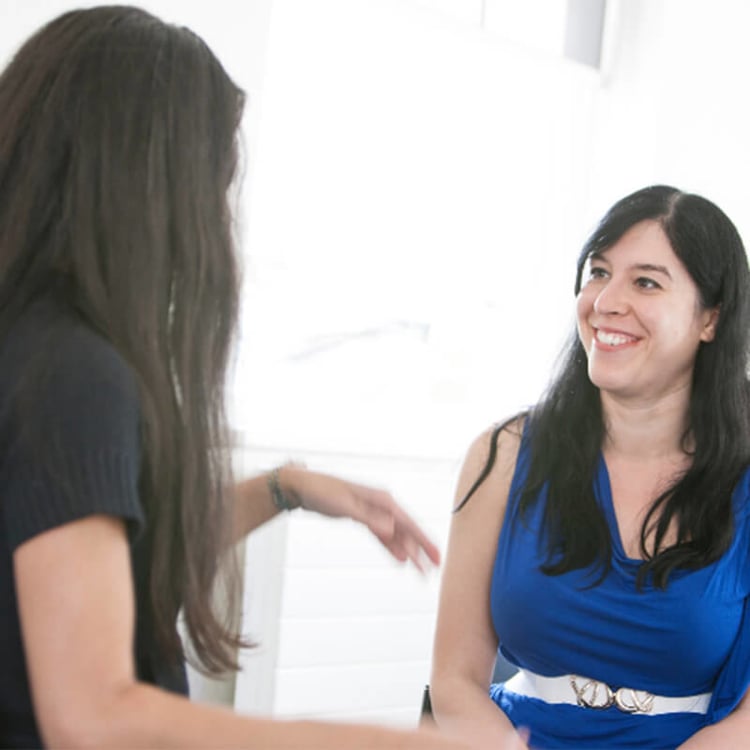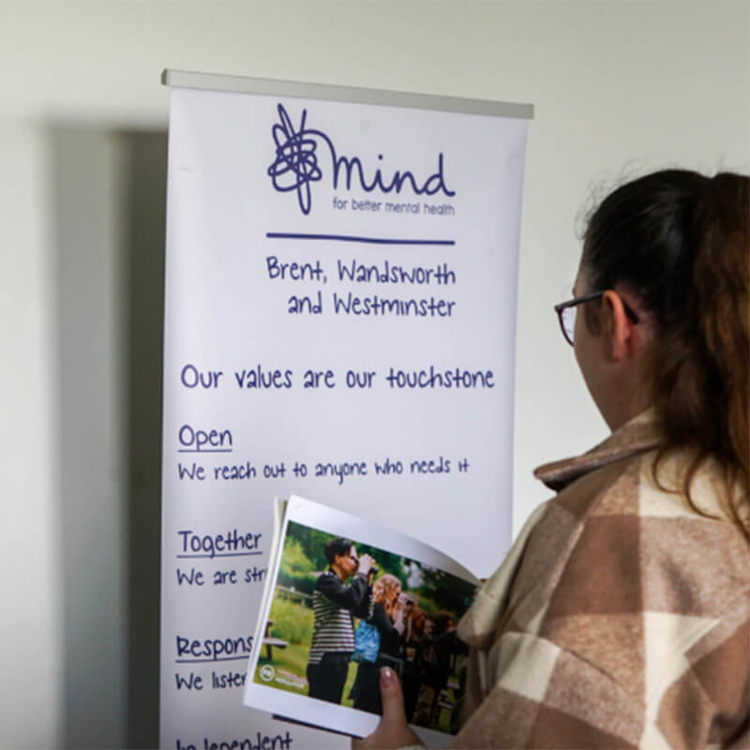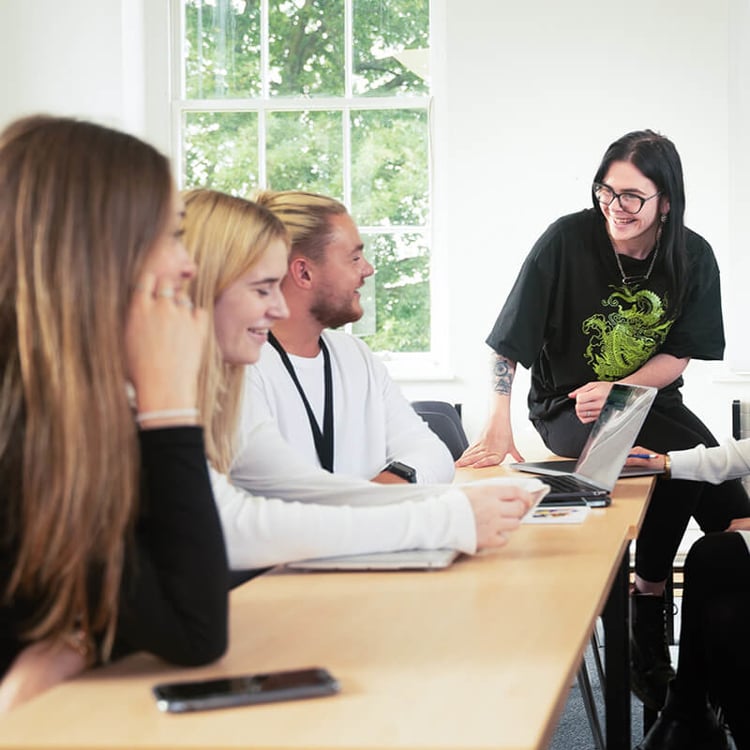/ Undergraduate /
Start date:
September 2025
You'll need:
112–128 UCAS points (or equivalent)
Foundation Year: 64–80 UCAS points (or equivalent)
UCAS Code:
3G90
3G91 (if choosing Foundation Year)

On-Campus Open Day
Saturday 12 July 2025
Begin building an inspiring career in counselling and psychotherapy at Roehampton, where we have an international reputation as a centre for therapeutic training.
Did you know?
You'll learn from registered practitioners and counselling experts.
Gain additional qualifications throughout your degree, such as a certificate in Mental Health First Aid, to give you a head start in your career.
Top 6 in London for Counselling & Psychotherapy
(Complete University Guide 2025)

Silver in the 2023 Teaching Excellence Framework (TEF)
For delivering high quality teaching, learning and outcomes for our students.

#8 in England for undergraduate student satisfaction
National Student Survey 2024

Foundation Year
This course can also be studied with a foundation year (September entry only).
Modules
Modules Details: This module provides an opportunity to maximise your success within and beyond your degree. Through interactive lectures and seminars, you will explore topics that prepare you for university, postgraduate study, and the workplace. Sessions address procrastination, time management, and anxiety, helping you reach your full potential. You will develop research and reporting skills essential for psychology and related fields. The module also explores artificial intelligence (AI), emphasising its role alongside human intelligence. Additionally, you will identify and develop key skills, gaining insight into future career opportunities and professional growth, empowering you to excel in your chosen path.
How you’ll learn: You will be taught through a mixture of lectures and seminars. Lectures will cover key information and concepts to support your personal development. The seminars offer hands-on opportunities to apply lecture concepts in practice. You'll work independently and with peers to develop skills such as resource finding, debating, analysing, and presenting. You will also learn to use AI critically, ethically, and creatively—for example, for feedback, discussing complex ideas, and interview practice. This will help deepen your understanding while identifying AI’s limitations. Seminar activities will also support your assessments, enhancing your ability to engage with AI effectively and refine your academic skills.
Assessment: The assessments provide engaging ways to showcase your skills and understanding. You will be evaluated through a presentation, a critical debate, and a reflection. These tasks will enhance your ability to communicate clearly, present information effectively, and write persuasively. You will also develop skills in using AI for critical debate and reflection. These assessments will strengthen key abilities essential for your degree, postgraduate studies, and many workplaces, preparing you for future academic and professional success.
Module details: This module introduces Humanistic and Person-Centred approaches, key components of the BSc Therapeutic Psychology and Counselling programme. You will explore the philosophical foundations of Humanism, its development, values, and its significant influence on psychology and therapy. Through a detailed study of Carl Rogers' Person-Centred Therapy and related Humanistic theories, you'll gain an understanding of human distress and transformation. The module also examines integrative approaches, the role of Humanism in diverse therapeutic contexts, and its evolving role in society.
How you'll learn: You will engage in a variety of learning methods, including lively discussions, debates, immersive role-plays, and hands-on activities. These will help deepen your understanding of the core principles of Humanistic and Person-Centred approaches. You'll critically evaluate the evidence base for Humanistic-Experiential Psychotherapies, considering their effectiveness in comparison to other therapeutic methods. By interacting with both theoretical and practical content, you'll enhance your critical thinking skills and develop a thorough understanding of these approaches in therapy.
Assessment: Assessment will be through a 10-minute theory-based video and a research poster, combining theoretical understanding with practical application. These assessments are designed to develop your research, presentation, and creative thinking skills. Formative feedback will be provided on the poster content, guiding you to improve your final video assessment. This innovative approach to assessment supports your learning and helps you refine your knowledge, ensuring that you are well-prepared for future professional practice in counselling and psychotherapy.
Module details: This module introduces research approaches and data analysis methods used in psychology and related fields. You will learn to develop research questions and analyse data using both quantitative and qualitative methods. Quantitative analysis includes statistical techniques to describe data and explore relationships, while qualitative methods focus on identifying themes in text or interviews. This knowledge is essential for your degree, particularly for further data analysis and your final-year research project, as well as for postgraduate study and workplace applications.
How you'll learn: This module combines lectures and workshops to develop your understanding of research approaches and data analysis. Lectures will introduce key concepts and theories, while workshops provide hands-on experience in developing research questions, designing studies, and analysing data. You will also learn to use various software packages for data analysis. These interactive workshops will reinforce lecture content and support your assessments, ensuring you gain practical skills essential for conducting research throughout your degree and in future academic or professional settings.
Assessment: In this module, you will be assessed through a poster on a specific research question and a portfolio including tasks such as a literature review and research write-ups. These assessments will develop your research, data analysis, written communication, and presentation design skills, which are essential for your degree, postgraduate studies, and are highly valued by employers, enhancing your employability.
Module details: This module equips you with both theoretical understanding and practical counselling skills, focusing on core competencies such as active listening, empathy, ethical decision-making, and self-awareness. You'll explore frameworks like Kolb’s Experiential Learning Model and Gibbs' Reflective Cycle, gaining insights into the principles of counselling. Key topics include boundary-setting, confidentiality, the therapeutic alliance, and ethical considerations. The module also addresses complex dynamics such as transference, countertransference, and emotion regulation, with experiential exercises to enhance self-awareness and therapeutic engagement.
How you'll learn: You will develop your counselling skills through workshops, seminars, and tutorials, engaging in role-play scenarios and experiential exercises in triad groups. This practical approach allows you to practice skills such as active listening, paraphrasing, and non-verbal communication. Self-reflection and peer feedback will be encouraged through journaling and structured activities, helping you understand your relational styles. Continuous feedback will support your growth, enabling you to refine your ability to engage effectively in professional, therapeutic relationships.
Assessment: Assessments include a Therapeutic Session Analysis, where you will evaluate a recorded counselling session to apply person-centred therapy concepts, and a Reflective Essay, focusing on personal growth and skill development. Formative assessments and tasks in seminars will help reinforce learning and improve your practice. These assessments are designed to deepen your understanding of counselling skills and reflective practice, preparing you for professional work in clinical and therapeutic settings. Feedback will guide you in honing your proficiency and setting future goals.
These modules are those we currently offer and may be subject to change.
Module details: This module will develop your knowledge of key areas in psychology, including social psychology, developmental psychology, and individual differences. You will explore how social influences shape thoughts and behaviours, how cognitive, social, and emotional development occurs across the lifespan, and how individuals differ in these processes. By evaluating different explanations for human behaviour, you will consider real-life applications, such as the impact of social media, peer influences, neurodiversity, and identity formation. This knowledge is essential for further study on social and developmental psychology and is valuable for careers in education, healthcare, social care, and community settings.
How you'll learn: This module is delivered through lectures and seminars, covering conceptual, theoretical, cultural, and historical perspectives on behaviour, identity, and individual differences. Lectures will link content to current affairs, while seminars will include interactive activities such as quizzes, discussions, and practical research exercises. You will explore real-world applications, such as identity formation and intelligence testing, while developing teamwork and self-reflection skills. These transferable skills will benefit various career paths, and seminar activities will also support you in preparing for assessments.
Assessment: You will be assessed through a poster and a portfolio, which will enhance your skills in presentation design, communication, and the ability to summarise, synthesise, evaluate, and apply psychological knowledge. These skills are essential for further study and postgraduate education, as well as highly valued by employers, supporting your future career development.
Module details: This module provides an in-depth exploration of various CBT models, including Cognitive Therapy, Rational Emotive Behaviour Therapy (REBT), Dialectical Behaviour Therapy (DBT), Acceptance and Commitment Therapy (ACT), and Schema Therapy. You will learn about the history, principles, and evidence-based applications of CBT for treating mental health conditions in psychotherapy and counselling. Key topics include the Cognitive and ABC Models, cognitive restructuring, behavioural activation, and mindfulness techniques, with an emphasis on adapting CBT for diverse cultural backgrounds.
How you'll learn: Innovative teaching methods will make your learning experience engaging and interactive. Practical exercises, reflection techniques, and collaborative group work will help you build a solid foundation in applying CBT. The course encourages a sustainable approach to professional development and self-care. Multimedia tools and digital resources will cater to different learning styles, allowing you to revisit materials outside of class for deeper understanding. You will also engage in comparative analyses of therapeutic models, enhancing your ability to critically evaluate and integrate CBT techniques.
Assessment: In this module, you will complete assessments to strengthen your understanding of CBT. You and a partner will role-play a CBT case scenario, demonstrating your knowledge of mental health conditions and cultural considerations. In the second assessment, you will analyse a CBT session video, applying techniques such as behavioural activation and experiments. These assessments offer real-world applications that enhance your professional skills, self-reflection, and critical analysis, preparing you for future work in psychotherapy and counselling settings.
Module details: In this module, you will expand your understanding of research approaches and data analysis methods in pPsychology and related fields. You will develop skills in advanced quantitative and qualitative analysis, including ANOVAs, regression, psychometrics, and qualitative methods like interpretative phenomenological analysis (IPA) and discourse analysis. This knowledge will be essential for your degree, particularly your independent research project in Year 3. More broadly, mastering research methods will enhance your ability to evaluate evidence throughout your studies. These skills are also highly valuable for postgraduate study and a wide range of careers that require data analysis and critical thinking.
How you'll learn: This module will be delivered through a combination of lectures and workshops, with lectures covering key concepts and theories in data analysis. In workshops, you will apply this knowledge by developing and conducting research studies, analysing data, and engaging in activities that support your assessments.
Assessment: You will be assessed through a qualitative and a quantitative research report, where you will describe the study's background and methods, analyse a dataset, and interpret the findings in the context of existing research. These assessments will enhance your research, data analysis, and written communication skills, which are essential for your degree, postgraduate studies, and a wide range of careers.
Module details: This module aims to enhance your mental health literacy by providing a comprehensive overview of theoretical models that explore human distress. It will help you understand emotional and psychological struggles, extending beyond clinical disorders. You will learn to differentiate between models of care and cure, emphasising the continuum between distressing experiences and clinical conditions. For example, you will examine how anxiety differs from Generalised Anxiety Disorder (GAD). This understanding will enable you to address psychological distress effectively, applying a nuanced approach to mental health care, essential for clinical, counselling, and psychotherapy professions.
How you’ll learn: Throughout this course, you will explore key theoretical models of mental health, including biomedical, psychodynamic, humanistic, cognitive, and psychoneuroimmunological approaches, with a historical perspective on their evolution across different populations. You will learn how each model conceptualises various forms of psychological distress, including stress, anxiety, and trauma. The module will also cover the distinction between normal distress and clinical disorders like PTSD and Generalised Anxiety Disorder (GAD). You will examine the impact of early adverse experiences on emotional regulation and attachment, and gain insights into the psychoneuroimmunological model, which integrates psychological processes with biological systems.
Assessment: The assessments for this module are innovative and based on peer review strategies to enhance learning outcomes. The first assessment involves exchanging a patchwork text with peers, covering a historical discussion, model conceptualisation, and counselling strategies for a chosen psychological distress. You will provide written feedback, which will be evaluated for quality and critical analysis. This feedback session prepares you for the second assessment, a comprehensive portfolio requiring critical examination of psychological distress from an intercultural perspective. Both assessments develop your analytical skills and offer opportunities for in-depth reflection and knowledge integration.
These modules are those we currently offer and may be subject to change.
This course offers all students the option of a one-year paid work placement, to boost your employability even further. If you choose this route, you will take the placement following year two of your course, and then return to complete your degree.
Why take a placement?
A placement year is the perfect opportunity to gain valuable work experience, to build on the career skills we will teach you on this degree. The connections you make on the placement will improve your career prospects further, and equip you with the skills you need to secure graduate-level employment.
How we support you
The University's Placement and Work Experience Team are experts at helping you to secure a placement. They will work closely with you from the start, helping you research potential employers, discover placement opportunities, create and pitch your CV, and will coach you to perform well in interviews. We aren't able to guarantee a placement, but our sector-leading advisors will give you the best possible chance of securing one.
Find out more about how we'll support you
We understand that your plans might change once you start your programme. If you decide not to do a placement, you will have the option of completing the three year version of your programme.
Whatever your choice, you will have access to many opportunities for work experience through our Placement and Work Experience Team, and access to face-to-face and 24/7 online careers support.
Module details: This module introduces you to key psychotherapeutic approaches within the programme. You will explore the theoretical principles of psychodynamic therapy, including psychoanalysis, and the influence of psychodynamic work on psychology and counselling. The module covers foundational theories such as drive theory, ego psychology, self-psychology, and object relations theory, with a focus on understanding personality and behaviour development. You will also examine contemporary models, such as mentalisation-based treatments and brief dynamic therapy, and their application in therapeutic contexts.
How you'll learn: You will engage in interactive lectures and workshops, where you will apply theoretical principles to real-life scenarios. Case studies will be analysed to identify individual difficulties and discuss treatment approaches. You will refine your skills through self-reflection, role-play, and case discussions, focusing on unconscious communication, transference, and countertransference. Additionally, workshops will help you learn how to set up and maintain a psychodynamic therapeutic frame and use interpretation to help clients gain insight into their behaviours and patterns.
Assessments: Assessment will involve practical application of psychodynamic concepts, such as interpreting unconscious processes and understanding transference and countertransference. You will be evaluated on your ability to conceptualise cases, apply psychodynamic techniques, and maintain a therapeutic frame. Through self-reflection exercises and small group discussions, you will demonstrate your understanding of psychodynamic theory. These assessments aim to prepare you for a successful career in psychotherapy and counselling, equipping you with the skills to manage therapeutic environments and endings effectively in mental health settings.
Module details: In this module, you will explore the dynamics of mental health care across various clinical and counselling settings, focusing on intervention strategies tailored to underrepresented communities. The module highlights the importance of creativity in therapeutic practices and the need for professional diversity in mental health. You will examine different therapeutic approaches for diverse populations, including children, adolescents, adults, and the elderly, while considering settings such as perinatal care and community-based interventions. This module prepares you to apply a wide range of skills and concepts in your future professional practice.
How you’ll learn: In this module, you will engage in a variety of learning activities designed to enhance your understanding and practical skills in clinical and counselling psychology. These include lectures, group discussions, and workshops focused on specific communities. You will explore real-world case studies to understand the complexities of working with diverse populations and settings. Practical exercises, role-playing, and reflective journaling will help you apply theoretical knowledge to real-life situations, fostering a holistic approach to mental health care and supporting your development through portfolio work.
Assessment: The assessments for this module are designed to provide real-world application and professional engagement. The Mental Health Worker Interview involves interacting with a mental health professional, offering insights into the field and helping you develop critical thinking, communication, and analytical skills. The Intervention Plan assessment requires you to create a hypothetical client scenario and design a comprehensive treatment strategy, promoting creativity and problem-solving. Formative feedback throughout the module will support your skills development, helping you gain a deeper understanding of clinical and counselling practices, such as treatment goals and risk assessments.
Module details: In this module, you will apply your knowledge of psychological research methods and data analysis to design, conduct, and report on an independent research project. You will formulate research questions, collect and analyse data, and interpret your findings in the context of existing literature, considering their implications. The available projects will cover various areas of psychology, allowing you to choose a topic of personal interest. The skills gained in planning, executing, and reviewing research are valuable for postgraduate studies and many careers.
How you'll learn: You will be supported by a supervisor with expertise in your chosen topic area, meeting regularly, typically in small groups. In addition to these meetings, lectures and workshops will help develop your research skills and support your work for the module, with lectures covering report-writing and data analysis methods, and workshops offering opportunities to apply these concepts to your own project. These sessions will provide valuable support for your assessments throughout the year.
Assessment: Whichever project you choose, you will need to write a project report and deliver a poster presentation, helping to develop your written and oral communication skills. Throughout the module, your work will also enhance your research and project management abilities, equipping you with a range of transferable skills that are valuable for postgraduate studies and various graduate careers.
Module details: This module focuses on your personal and professional development, preparing you for a career in clinical, counselling, and psychotherapeutic settings. It provides practical knowledge and skills needed to navigate professional structures, hierarchies, and workplace dynamics within UK mental health settings. You will develop strategies for effective collaboration in multidisciplinary environments and complete a minimum of 30 hours of voluntary experience in a mental health setting to boost employability. The module is open to various roles, ensuring experience in a helping relationship within mental health contexts.
How you’ll learn: In this module, you'll engage in both theoretical and practical learning to enhance your skills as a mental health professional. Through a combination of seminars, workshops, and online training, you’ll develop essential skills such as effective communication, leadership, and ethical decision-making. You’ll also explore different professional structures and settings in mental health, including NHS, private practice, and community centres. The module includes a voluntary placement where you can apply your learning in real-world contexts, gaining hands-on experience and reflecting on your interpersonal skills and workplace dynamics.
Assessment: Your learning will be assessed through a professional development portfolio, where you will document key skills and experiences essential for a successful mental health career. Regular formative assessments during seminars will support this process. The second assessment involves a reflective journal documenting your voluntary work in a mental health setting, including critical reflections on your personal and professional growth. You will also explore a key moment in your placement, enhancing your self-awareness and your ability to make sound ethical decisions in practice.
These modules are those we currently offer and may be subject to change.
This course offers a foundation year, which takes place at the beginning of your studies. Studying a foundation year will give you academic and practical experience, and a strong introduction to your subject, ensuring you succeed on your undergraduate degree.
30 credits
You will develop your core academic and integrated English language skills of speaking, listening, reading and writing. You will become familiar with key academic skills and concepts, such as referencing methods and awareness of academic integrity and tone. You will apply these skills and knowledge to both broad topics and also your chosen subject pathway.
Teaching and learning
You will be required to actively engage in on-campus learning for up to 10 hours a week.
You will be taught through a full range of teaching and learning methods, which include lectures, seminars, workshops, discussion groups, group directed tasks and presentations. This will enable you to learn from your peers and tutors in both structured and information settings.
You will be encouraged to think creatively about your approach to learning and discussions with your peers. You will also have access to recordings, resources, links and signposting through Moodle to enrich your learning.
Assessment
You will be assessed through group and individual presentations, comparative and reflective essays, multiple choice exams, coursework and reports, oral exams, portfolios, case studies and blogs.
30 credits
You will develop your research, numeracy and information technology skills. You will investigate the difference between primary and secondary research, conduct your own research project and demonstrate your findings through data analysis. You will also develop your awareness of equality, diversion and inclusion in the UK, through a real-world issue; discrimination in the workplace.
Teaching and learning
You will be required to actively engage in on-campus learning for up to 10 hours a week.
You will be taught through a full range of teaching and learning methods, which include lectures, seminars, workshops, discussion groups, group directed tasks and presentations. This will enable you to learn from your peers and tutors in both structured and information settings.
You will be encouraged to think creatively about your approach to learning and discussions with your peers. You will also have access to recordings, resources, links and signposting through Moodle to enrich your learning.
Assessment
You will be assessed through group and individual presentations, comparative and reflective essays, multiple choice exams, coursework and reports, oral exams, portfolios, case studies and blogs.
30 credits
This module focuses on an in-depth exploration of applied psychology, drawing on foundational theories and models that explain human behaviour. You will engage with the issues and debates around some of the core psychological concepts, such as prejudice, stereotyping, group dynamics, and conformity, gaining a broad understanding of what influences human behaviours.
The module introduces the bio-psycho-social model within health psychology, providing a holistic framework for understanding health-related behaviours. You will gain a knowledge of how different psychological theories and models can be applied to understand the development of risky health behaviours and can be applied to design effective health intervention strategies.
You will learn the skill of collaborative group work, which is an integral part of the module, encouraging you to apply your knowledge of psychological theories to analyse and present a case study on risky health behaviour. You will also develop the skill of critical analysis, integrating various theories and models in psychology to explain risky health behaviour and suggest intervention programs.
Teaching and learning
The teaching delivery for each module consists of one, one-three-hour lecture and one, two-hour seminar per week. You will learn through a blend of lectures and interactive sessions, case studies and group presentations.
There will be an additional 30 minutes of online support per week. This will consist of individual tasks such as quizzes, posting on discussion forums, watching videos and taking notes, and reading articles or chapters.
Assessment
This module will be assessed using a written assessment and a group presentation.
50% - written assessment, composed of two parts; essay and self-reflection. You will write an essay on your knowledge of at least two psychological theories or models to explain why people develop risky health behaviours and propose and evaluate intervention strategies. You will reflect on your experience and learning journey as you prepared for and wrote the essay.
50% - group presentation, where you will apply knowledge from psychology theories to plan health interventions on risky health behaviour.
30 credits
This module focuses on the different perspectives available in psychology to explain human behaviour.
You will get the opportunity to explore methods of scientific thinking and reasoning within a Psychology context in an enquiry-based way. Problem-based learning and blended learning (combines online and face-to-face time) approaches will facilitate deep, experiential learning.
You will gain knowledge on what scientific thinking is, how to distinguish this from pseudoscience and how the scientific cycle enquiry can be applied to the various perspectives in psychology.
You will be encouraged to explore how different perspective in psychology can explain human behaviour, scientific argumentation and ethical working practices in relation to current scientific topics as reflected in news reports, recent academic publications and historical case studies. You’ll gain the skill of critical thinking and how to apply concepts from psychology to explain everyday behaviour, as well as poster presentation and public speaking.
Teaching and learning
The teaching delivery for each module consists of one, one-three-hour lecture and one, two-hour seminar per week. Lectures will introduce the scientific basis of knowledge and research methodologies in the context of Psychology and empower you to distinguish between science and pseudoscience, while seminars will consist of individual and group activities on the weekly topics.
There will be an additional 30 minutes of online support per week. This will consist of individual tasks such as quizzes, posting on discussion forums, watching videos and taking notes, and reading articles or chapters.
Assessment
This module will be assessed using a group poster presentation and written assessment.
40% - group poster presentation, you will compare and contrast any two perspectives on psychology.
60% - written assessment, you will write a critical essay on how pseudoscience differs from science.
These modules are those we currently offer and may be subject to change.

Skills
Learn how to work with others to help them achieve their goals and potential on our unique undergraduate degree.
You'll develop an understanding of:
- Current professional practice for working therapeutically with clients, and the skills related to managing the counselling process
- Mental health and how to support different population groups and communities, as well as how to work in different professional contexts
- The importance of research in therapeutic psychology by completing your own research project, giving you the opportunity to investigate a topic you are passionate about.
This well-rounded learning approach, alongside voluntary work experience, will give you a strong foundation for a career in the helping professions or postgraduate study.
Learning
You’ll be part of an inspiring and welcoming learning environment.
Working closely with your lecturers and fellow classmates, you’ll grow as an individual.
At least 50% of your teaching will be in seminars or practical workshops, allowing you to develop core therapeutic skills as well as giving you contact time with your lecturers.
You’ll be learning from leading psychologists and counselling experts and practitioners, who enthusiastically bring their real-life experience into the classroom.

Assessment
There are very few formal examinations or essays on our BSc Therapeutic Psychology and Counselling degree.
Instead, you’re assessed through projects, tasks and exercises that replicate the working world you'll graduate into.
Between Years 2 and 3, you can also opt for a professional placement year, meaning you have the opportunity to apply for a placement and gain valuable real-world experience.
Career
You will be in a strong position to build a career as a psychotherapist or counsellor.
You could also take your skills into a safeguarding organisation, the police, social services, education, HR or broader helping professions.
Pathways to further study
At Roehampton we have excellent pathways into further study. Should you wish to go onto further postgraduate study to become a registered counsellor psychotherapist, we have one of the largest therapeutic training Schools in the country, with leading courses in Integrative Counselling and Psychotherapy and all five Arts and Play Therapies.

Open days
Get a real taste of our campus, community and what it’s like to study at Roehampton
Applying
Full-time UK undergraduate students apply through UCAS.
Course subject to curriculum enhancement and revalidation.
Entry tariff
112–128 UCAS points (or equivalent)
Foundation Year: 64–80 UCAS points (or equivalent)
Looking to work out your UCAS points or find out about our entry requirements? Find out more.
When we consider applications to study with us, we form a complete view of your achievements to date, and future potential, and can offer flexibility in entry requirements. Find out more about our Contextual Offer scheme.
General entry requirements
September 2025 entry tuition fees
UK (home) tuition fees
Undergraduate degree: £9,535
Foundation Year: £9,535
We offer a wide range of scholarships and bursaries. See our financial support pages for UK students.
We also provide other ways to support the cost of living, including free buses and on-campus car parking, hardship support and some of the most affordable student accommodation and catering in London. Find out more about how we can support you.
Additional costs to consider
Travelling to and from work experience may require some additional expenses.
Some work experience may require students an enhanced DBS check.
International undergraduate students apply through our direct application system.
Course subject to curriculum enhancement and revalidation.
Entry tariff
112–128 UCAS points (or equivalent)
Foundation Year: 64–80 UCAS points (or equivalent)
Looking to work out your UCAS points or find out about our entry requirements? Find out more.
When we consider applications to study with us, we form a complete view of your achievements to date, and future potential, and can offer flexibility in entry requirements. Find out more about our Contextual Offer scheme.
General entry requirements
September 2025 entry tuition fees
EU and international tuition fees
Undergraduate degree: £16,950
Foundation Year: £16,950
International Foundation Pathway: £16,950
We offer a wide range of scholarships and bursaries. See our financial support pages for international students.
We also provide other ways to support the cost of living, including free buses and on-campus car parking, hardship support and some of the most affordable student accommodation and catering in London. Find out more about how we can support you.
Additional costs to consider
Travelling to and from work experience may require some additional expenses.
Some work experience may require students an enhanced DBS check.






